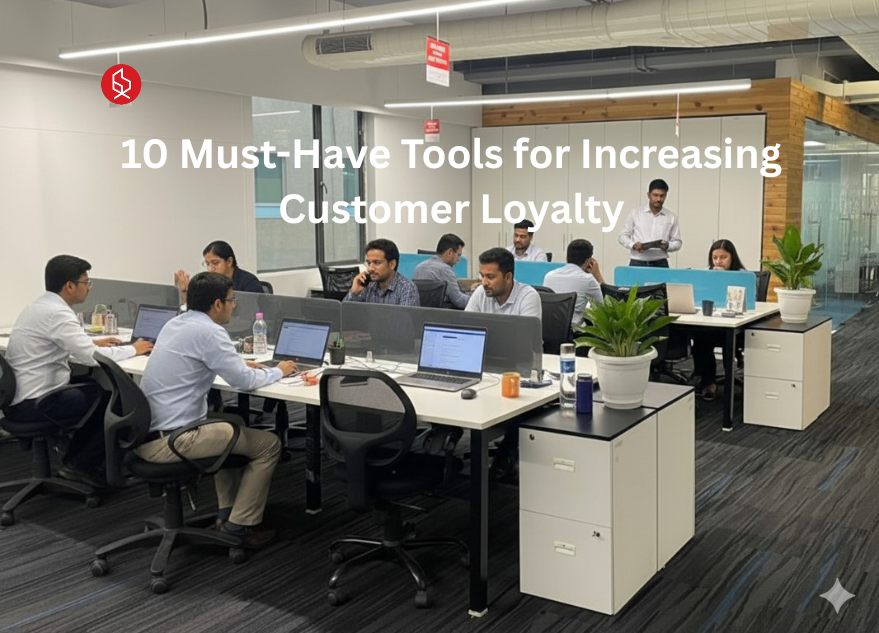Building strong customer loyalty is essential for any business aiming for long-term growth. By using the right tools and strategies, companies can improve retention, boost engagement, and create lasting customer relationships.
💡 Are you looking for Coworking space in Gurgaon, Noida or Delhi? We are just a call away. Call Now: 08999 828282
10 Essential Tools to Boost Customer Loyalty
- Customer Relationship Management (CRM) Tools
- Email Marketing Automation Platforms
- Customer Loyalty Software
- Customer Feedback and Survey Tools
- Live Chat and Chatbot Tools
- Social Media Management Platforms
- Personalized Marketing Tools
- Customer Support Helpdesk Software
- Analytics and Reporting Tools
- All-in-One Customer Loyalty Platforms
1. Customer Relationship Management (CRM) Tools
Customer relationship management tools help businesses organize, track, and analyze customer interactions. A good CRM stores essential details such as purchase history, preferences, and communication records. This enables personalized communication and timely follow-ups, which increase trust and loyalty.
Popular CRMs like Salesforce or HubSpot provide analytics that help identify customer behavior trends. With this insight, businesses can design better customer retention strategies and improve satisfaction. By integrating CRM with sales and support, companies can deliver consistent experiences. For small businesses and startups, investing in a reliable CRM tool is often the first step toward building stronger customer loyalty.

2. Email Marketing Automation Platforms
Email marketing is one of the most effective customer retention tools. Automation platforms like Mailchimp or Klaviyo allow businesses to send targeted campaigns, personalized offers, and follow-up messages. With segmentation, companies can group customers based on their preferences or purchase behavior, ensuring relevant communication.
Automated workflows save time and ensure that customers receive consistent updates. These platforms also provide performance metrics such as open rates and click-through rates. By analyzing these insights, businesses can refine their customer retention strategies and improve engagement. A well-timed email reminding customers of their favorite product or offering loyalty discounts can significantly boost repeat purchases.
3. Customer Loyalty Software
Customer loyalty software helps companies design reward programs that keep customers coming back. These tools allow businesses to offer points, discounts, or exclusive perks for repeat purchases. Platforms like Smile.io or LoyaltyLion make it easy to set up and manage these programs. They also provide analytics on customer participation, helping businesses understand what motivates their audience.
Reward systems not only increase engagement but also create emotional connections with the brand. By integrating customer loyalty software with CRM and e-commerce platforms, businesses can track performance and continuously optimize their programs. This makes loyalty-building both effective and scalable.
Also Read: Tools that Every Entrepreneur Needs to Succeed in 2025
4. Customer Feedback and Survey Tools
Listening to customers is key to building trust. Customer feedback tools such as SurveyMonkey or Typeform help businesses gather opinions directly from their audience. By collecting insights on product quality, service experience, or website usability, companies can identify areas for improvement. Regular surveys also show customers that their voices matter. This strengthens loyalty by making them feel valued and heard.
Feedback tools often integrate with customer engagement platforms, enabling quick action on issues raised. Businesses that act on feedback not only improve satisfaction but also gain loyal advocates. In the long run, this proactive approach supports stronger customer retention strategies.
5. Live Chat and Chatbot Tools
Instant communication is essential for building loyalty in today’s fast-paced world. Live chat and chatbot tools like Intercom or Drift provide quick responses to customer queries. They reduce wait times and ensure that customers receive support whenever they need it. Automated chatbots can handle common questions, while live agents manage complex issues.
These tools also collect conversation data, helping businesses identify recurring problems and improve services. By resolving issues quickly, companies enhance the overall customer experience. A seamless support system strengthens trust and improves retention, making live chat one of the most valuable customer engagement tools available.
6. Social Media Management Platforms
Social media plays a major role in modern customer engagement. Platforms like Hootsuite or Buffer allow businesses to schedule posts, monitor conversations, and interact with followers. By managing all channels from one dashboard, companies save time and maintain consistent communication. These tools also provide insights into customer sentiment and content performance.
Businesses can use this data to adjust strategies and engage more effectively. Strong social interactions build community, encourage repeat purchases, and foster brand loyalty. When combined with other customer loyalty platforms, social media management becomes a powerful way to connect with customers daily.
7. Personalized Marketing Tools
Customers appreciate businesses that understand their preferences. Personalized marketing tools like Dynamic Yield or Optimizely help create tailored experiences across websites, apps, and emails. These platforms analyze user behavior and deliver customized recommendations or offers. For example, showing product suggestions based on browsing history can encourage repeat purchases.
Personalized messages make customers feel recognized, which builds loyalty. These tools also integrate with CRMs and customer loyalty software to provide consistent personalization across all touchpoints. By combining personalization with other customer retention tools, businesses can significantly improve satisfaction and long-term engagement.
8. Customer Support Helpdesk Software
A reliable helpdesk system ensures customers receive efficient support. Tools like Zendesk or Freshdesk organize customer requests, assign them to the right team members, and track progress. This reduces delays and prevents issues from being overlooked. Many helpdesk platforms include knowledge bases and self-service options, empowering customers to solve problems independently.
These features improve satisfaction while reducing workload for support teams. Clear communication and quick resolutions are vital for strong customer retention strategies. Businesses that use helpdesk software show customers they value their time, which strengthens trust and loyalty over time.
💡 Are you looking for Coworking space in Gurgaon, Noida or Delhi? We are just a call away. Call Now: 08999 828282
9. Analytics and Reporting Tools
Understanding customer behavior is critical for improving loyalty. Analytics platforms like Google Analytics or Mixpanel provide data on website usage, customer journeys, and conversion rates. With these insights, businesses can identify where customers drop off and create better experiences. Advanced reporting tools also highlight the effectiveness of customer loyalty platforms and engagement campaigns.
By tracking performance regularly, businesses can refine their customer retention tools and strategies. Data-driven decisions help companies allocate resources effectively, improve customer satisfaction, and boost long-term loyalty. Analytics ensures businesses always stay one step ahead in meeting customer needs.
10. All-in-One Customer Loyalty Platforms
For businesses seeking a complete solution, all-in-one customer loyalty platforms are ideal. These tools combine CRM, loyalty programs, analytics, and engagement features into one system. Examples include Zoho CRM Plus or Adobe Experience Cloud. With everything in one place, companies can track customer interactions, reward loyalty, and manage campaigns efficiently.
These platforms also provide detailed reporting, helping businesses understand what drives retention. By using integrated systems, businesses avoid data silos and deliver seamless customer experiences. All-in-one platforms are especially useful for growing businesses that want to scale their customer retention strategies effectively.
Building customer loyalty doesn’t happen overnight—it requires consistent effort, the right strategies, and smart tools that strengthen trust and engagement. By leveraging these 10 must-have tools, businesses can create long-term relationships that drive growth and retention. And if you’re looking for a workspace that supports collaboration, networking, and stronger client relationships, The Office Pass (TOP) is the right choice. With flexible coworking solutions, TOP helps businesses thrive in a community-driven environment.
To know more, call 8999 828282.
Frequently Asked Questions (FAQs)
Question: What are customer relationship management tools?
Answer: Customer relationship management (CRM) tools are software systems that help businesses manage customer interactions, track purchase history, and organize data. They improve communication, support personalization, and play a key role in customer retention strategies by ensuring customers receive timely and relevant experiences.
Question: How do customer retention strategies benefit businesses?
Answer: Customer retention strategies focus on keeping existing customers loyal. They are important because retaining a customer is often more cost-effective than acquiring a new one. Strong strategies increase repeat purchases, build trust, and encourage customers to recommend the brand to others.
Question: Why is customer loyalty software important?
Answer: Customer loyalty software helps businesses design and manage rewards programs. These programs encourage repeat purchases by offering points, discounts, or special perks. Loyalty software strengthens emotional connections between customers and brands, making customers more likely to stay long-term.
Question: What are customer engagement tools?
Answer: Customer engagement tools include platforms for email marketing, social media management, live chat, and personalized marketing. They enable businesses to interact with customers across different channels. Engaging customers regularly builds trust, strengthens relationships, and improves loyalty.
Question: How do customer retention tools work?
Answer: Customer retention tools include CRMs, helpdesk software, and loyalty programs that track and improve customer interactions. They work by ensuring customers receive excellent support, timely offers, and personalized experiences. These tools directly reduce churn and increase long-term loyalty.
Question: Are all-in-one customer loyalty platforms worth it?
Answer: Yes, all-in-one customer loyalty platforms provide multiple functions in a single system. They combine CRM, loyalty programs, analytics, and engagement features, making it easier to manage customer relationships. This integration improves efficiency and ensures consistent customer experiences.
Question: How can feedback tools improve customer loyalty?
Answer: Feedback tools help businesses collect customer opinions on products and services. Acting on this feedback shows customers that their voices matter. When customers feel valued, they are more likely to trust the brand, remain loyal, and recommend it to others.
Question: What is the role of analytics in customer retention?
Answer: Analytics tools provide insights into customer behavior, purchase patterns, and engagement levels. These insights help businesses improve their customer retention strategies by identifying what works and what doesn’t. Data-driven decisions lead to stronger customer relationships and loyalty.
Question: Do small businesses need customer loyalty tools?
Answer: Yes, even small businesses benefit from customer loyalty tools. Simple CRMs, email platforms, or reward programs can make a big difference in improving customer engagement and retention. Starting early with these tools helps small businesses build strong customer relationships.
Question: What makes a good customer retention strategy?
Answer: A good customer retention strategy combines personalized communication, consistent engagement, excellent support, and rewards. It also uses the right tools, such as CRM systems and loyalty software, to deliver seamless experiences. The goal is to build long-term trust and encourage repeat purchases.



